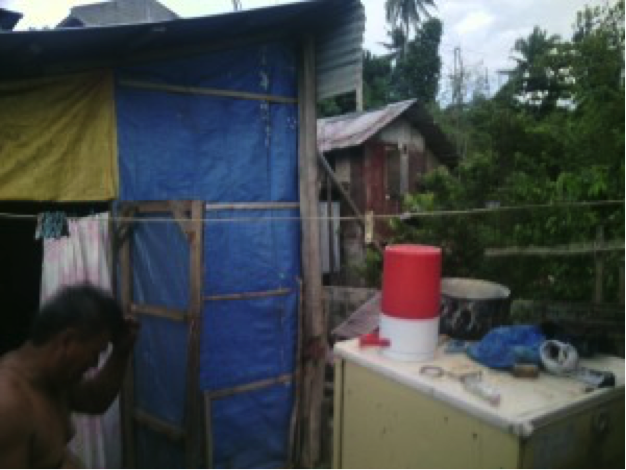Workers in Leyte, still far from recovery a year after Haiyan

Leyte–A year after Super Typhoon Haiyan battered Central Visayas, the working people of Leyte are still struggling to recover as poverty worsened with continued loss of jobs, lack of livelihood, inadequate government support and turtle-pace rehabilitation programs of the Aquino administration.
Even those previously employed and promised jobs are still far from resuming their normal lives. Over 1,800 rank and file workers at PhilPhos for instance, have yet to recover from the loss of property and damage to their homes caused by the strongest typhoon to hit the country in recent history.
In a Center for Trade Union and Human Rights’ interview with Oliver Llagas, Board of Directors of the workers union at PhilPhos, he reported that the company promised many times to re-open (on March, August and October) but has not resumed operations until now allegedly due to conflicts with the insurance company. As a result, over 1,500 casual workers of the PhilPhos were retrenched. Some of them resorted to informal work like fishing and driving pedicabs while others found jobs in Pasar, another fertilizer plant in Isabel, Leyte.
Meanwhile, the remaining 340 union members at Philphos were at least allowed and paid to work for the maintenance and rehabilitation of the factory site.
The income however, is far lesser as Llagas and his co-workers can only work five days a week with no overtime. Their income cannot match the damages caused by the super typhoon and Llagas family situation has worsened than before. Like most of his co-workers in Philphos, Llagas has not fully restored his house one year after.
Llagas and other residents of Isabel, Leyte also expressed dismay over the very little support they have been receiving especially from the government. Llagas noted having received relief goods from the DSWD three times since the typhoon. He heard that financial assistance from P10,000 to P30,000 was given to those families whose homes were partially and totally-damaged but he and his co-workers did not get any.
Llagas also expressed fear that if the company’s situation drags longer, the factory may eventually shutdown which means loss of jobs for another 340 workers.
Network of disaster survivors formed
If there is an obvious positive development in the aftermath of this disaster,it is the formation of ‘Daluyong’, a network of disaster survivors specifically in Visayas and Mindanao following a conference held yesterday, November 6 in Tacloban City. CTUHR who attended the activity, says that the coming together of survivors and taking a lead role in demanding accountability against government neglect, amidst pronouncements of billions of support, is the most positive thing that calamities such as Haiyan had so far created.
“The Aquino government promises and reports of billions of pesos spent for rehabilitation only serve to aggravate the misery of and injustice to thousands still living in tents and from charity of others. In some decent housing projects, it is obvious that private sector delivers more, even without talking about it, and government seems content on private sector taking on the government obligations,” Daisy Arago, CTUHR Executive Director said.
‘Daluyong’ which literally means upsurge brought together typhoon, earthquakes survivors from Visayas and Mindanao as well as victims of atrocities like the Zamboanga siege to hold the Aquino government accountable for its “criminal neglect” to the victims and survivors of calamities.
“The poor who is always the immediate casualties of calamities created and aggravated by capitalist development greed thru forest denudation, reclamation of waters, mining to land coversion is pushed to unimaginable poverty and survivors have every right to demand justice. These demands are worth supporting and CTUHR supports and will continue to support such demand,” Arago added.###
CTUHR together with its partner organizations conducted relief operations in Leyte, Samar, Iloilo, Capiz and has an ongoing rehabilitation projects in farming communities of Eastern and Western Samar. CTUHR is a partner of American Jewish World Service (AJWS) in its effort to support the victims of typhoon Haiyan.
